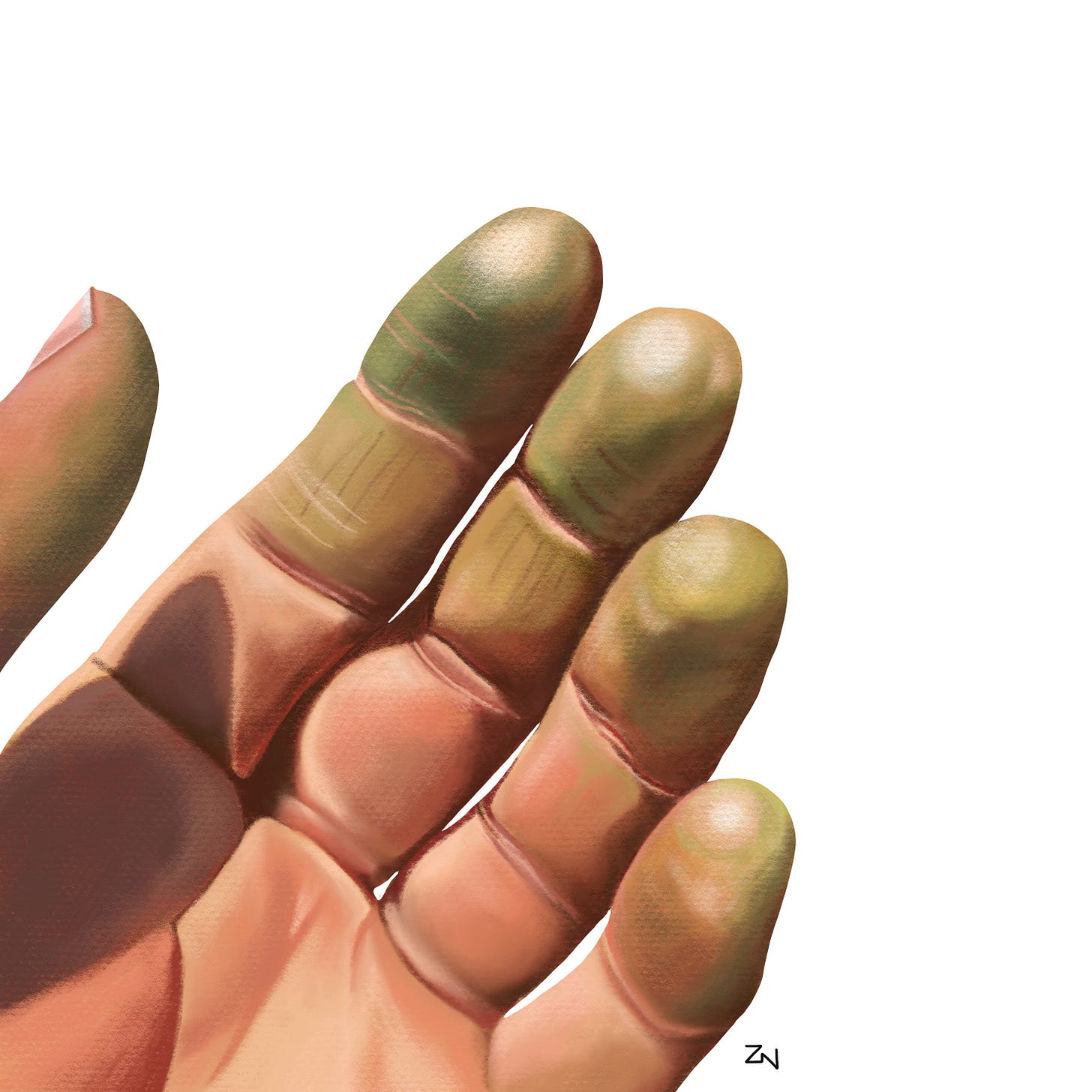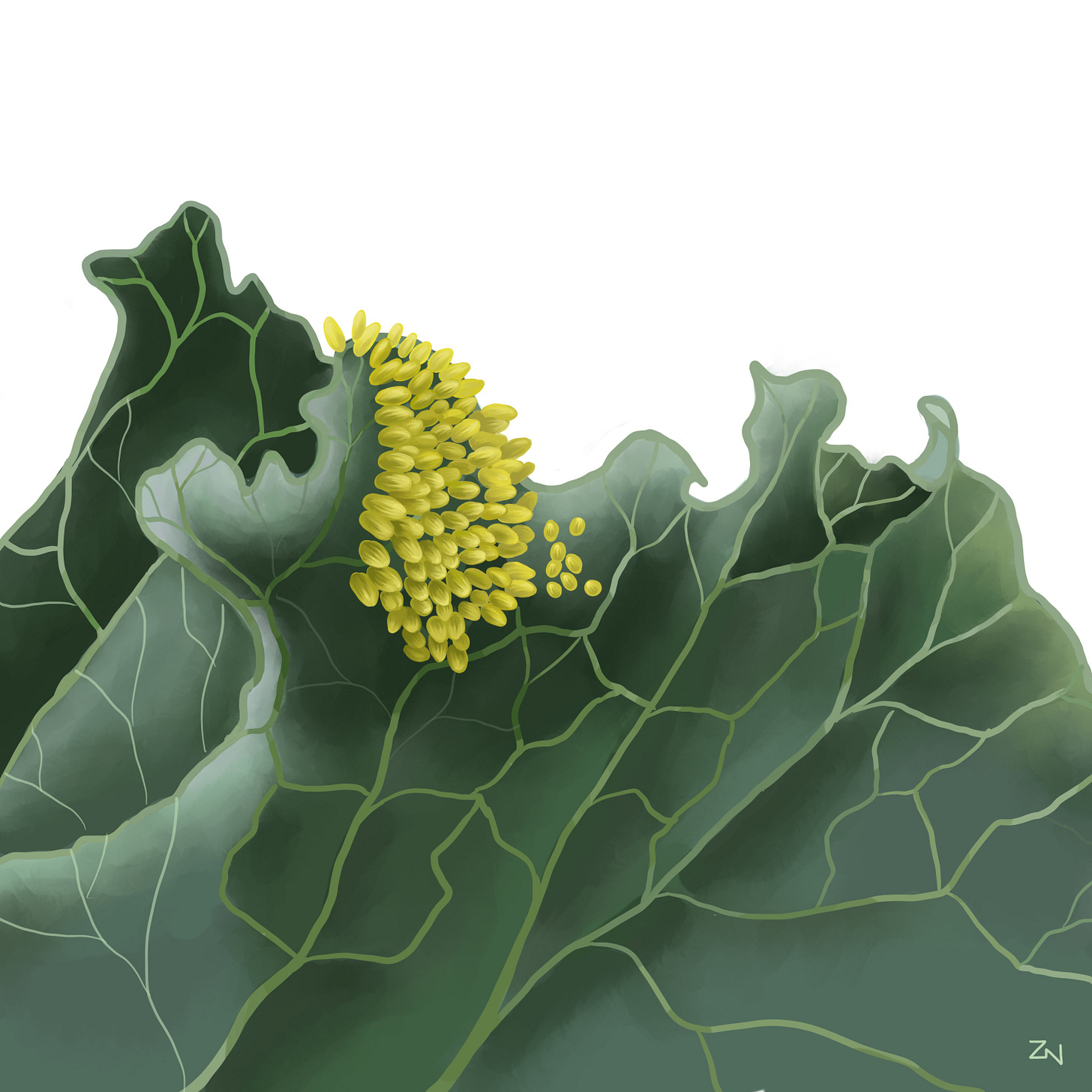“My green thumb came only as a result of the mistakes I made while learning to see things from the plant’s point of view.”
FRED DALE
How many times have you heard the line ‘I don’t have green fingers, I have black fingers, I just kill everything, ha-ha.’ I’ve been told this a few times. I usually laugh along, but honestly, where do people think those green fingers come from exactly?
I often dispute the idea of natural talent, i.e. the idea that some people are born with it. Maybe some people are, I’m not sure, but generally I think we get good at doing something when we do it a lot, mainly because we enjoy it. I loved drawing as a child, but unlike most people, I never stopped doing it. After school, I went to art college, and I learned some skills there, but mostly I did a lot more drawing. I went on to university and did a degree in graphic design, but I never stopped drawing. Then, after I started my first job at a publishing company that involved sitting in front of a computer all day, I signed myself up for evening life-drawing classes, because I missed drawing like a drug I had become dependent on. If you practice a skill consistently, you eventually get better.
I think it’s much the same with gardening. Nobody in my mind is born with green fingers, knowing how to garden. They only become tinged with green after many years of putting them to good use in a garden. Or when you’ve been pinching out the side shoots of tomatoes, as per my illustration below!
Gardening skills are hard-earned through a lot of trial and error. There isn’t a gardener out there who hasn’t inadvertently killed a plant or two, or many more, but the difference is we don’t give up. Rather than condemning our fingers to being the wrong colour and declaring ourselves useless, we learn from that dead plant, understand what went wrong, and try again. I think this is the same for learning any skill. You either give up at the first hurdle and decide it’s not for you, throw in the proverbial trowel, or you learn and persevere. You’ll only do this if you discover you enjoy it, and that’s the key.
Putting aside for a moment, professional horticultural qualifications for careers in this area, I think the very best garden teacher is mother nature herself, and the best classroom is the garden. Through careful observation and lots of trial and error, you can glean an awful lot of wisdom from a garden, and very specifically, what works or doesn’t in your particular patch of earth. Every year brings something different, and over time you learn from every adverse condition, and it is usually through adversity that you learn the most, as the saying goes ‘smooth seas don’t make for a skillful sailor.’
You get to know the seasons and environmental conditions in your area like a pro. You get to know roughly when the last chance of frost has passed so you can confidently plant out your tender crops, you recognise a false spring when you witness it and are no longer fooled, and you come to know which bit of your veg garden or allotment is liable to flood over winter so you avoid planting over-wintering crops there. You learn the hard way that young plants and seedling sitting in too much water will die as quickly as those left to dry out in hot sun. After losing plants to either drought or floods you start to understand which plants will tolerate either condition, and maybe after some trial and error, you learn which plants prefer to hide in the shade and which ones are sun worshippers.
It takes the loss of a few plants to understand the importance of ‘right plant, right place’, and that’s okay, it’s all part of the learning curve that Mother Nature will put you on if you decide to work alongside her in the garden.
The bugs and wildlife in the garden teach you when and where to add protection, netting against pigeons and cabbages whites for the brassicas, wool pellets around the first plantings of tender baby lettuces to keep off the slugs, a low barrier around carrots to deter carrot fly. It’s only when you’ve experienced the savage loss of plants to other creatures that you quickly figure out the best way to stop it happening again. Of course, you can learn a lot from the internet, from other gardeners, or from books, these are all valuable tools for information and advice, but you can’t possibly learn everything you need to know before you even get your hands dirty. You learn on the hoof, through sheer necessity.
When I first got my allotment, I’ll admit I was slightly paralysed by the fear of not knowing where to start. I bought a book instead of a spade, and that was my first rookie mistake. I see it in new people who take on nearby plots, a bit intimidated and hesitant to start. I want to tell them to not worry and just get stuck in. I could give them tons of advice, but it will mostly be lost on them, or forgotten, and will only frighten them more. So I try to just encourage them to go for it, ask me if they need help, but otherwise just start somewhere, anywhere.
Learning how to garden is just scratching the surface of what a garden will teach you. The really important lessons are those of patience, resilience, respect for nature and the planet. The understanding that we are a part of nature and not in control of it will help you to find ways to work with it, so that nature isn’t damaged or compromised along the way. Careful observation will teach you the importance of maintaining a balanced ecosystem. A garden will teach you to slow down, take your time, it doesn’t take part in the rat-race of life, you can’t hurry it along to fit to your schedule. But equally it will not wait for you to catch up when you’re not around and it’s in full flow, so there are times when nature urges you to pull your finger out and act now before it’s too late.
It will also teach you the importance of reciprocity, that you only get back what you put in. There’s a relationship between you and the plants you choose to grow, and for the most part, they will do their thing regardless, but you will both be much happier if you put some work in too. Tend to your plants with care, and they will thrive and give back beauty and/or bounty.
I’ve been gardening for around 20 years, which is a smidgeon of time compared to some, and yes I have learnt a lot in that time (too much to even start listing here) but I never stop learning. There seems to always be a new lesson each and every year, and (unlike some of my days at school) I wholeheartedly look forward to those lessons.
I hope you enjoyed reading this post and my illustrations. If you want to support me, you can buy me a coffee here, or why not have a little mooch in my Etsy Store - Zoe’s Garden Prints. Liking and sharing this post also helps enormously. Thanks.






